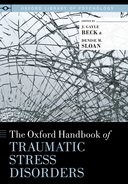 The Oxford Handbook of Traumatic Stress Disorders
The Oxford Handbook of Traumatic Stress Disorders
Contents
-
-
-
-
-
-
-
-
-
-
-
-
-
-
-
Theoretical Constructs and Models Accounting for PTSD and Close Relationship Problems Theoretical Constructs and Models Accounting for PTSD and Close Relationship Problems
-
Effect of Close Others on Trauma Recovery and PTSD Effect of Close Others on Trauma Recovery and PTSD
-
Social Support Social Support
-
Adult Attachment Adult Attachment
-
-
Effect of Trauma and PTSD on Close Others Effect of Trauma and PTSD on Close Others
-
Secondary/Vicarious Traumatization Secondary/Vicarious Traumatization
-
Caregiver Burden Caregiver Burden
-
Ambiguous Loss Ambiguous Loss
-
Intergenerational Transmission of PTSD Intergenerational Transmission of PTSD
-
-
Reciprocal Influences of PTSD and Close Relationship Functioning Reciprocal Influences of PTSD and Close Relationship Functioning
-
Couple Adaptation to Traumatic Stress Model Couple Adaptation to Traumatic Stress Model
-
Cognitive-Behavioral Interpersonal Theory of PTSD Cognitive-Behavioral Interpersonal Theory of PTSD
-
-
-
Conclusions and Future Directions Conclusions and Future Directions
-
References References
-
-
-
-
-
-
-
-
-
-
-
-
15 Family Models of Posttraumatic Stress Disorder
Get accessCandice M. Monson, Ryerson University, Toronto, Canada, And, VA National Center for PTSD, Women's Health Sciences Division, Boston University School of Medicine Boston, MA
Department of Human Development and Family Studies, Pennsylvania State University
Rachel Dekel, The Louis and Gabi Weisfeld School of Social Work, Bar Ilan University, Ramat-Gan, Israel
Alexandra Macdonald, VA National Center for PTSD, Behavioral Science Division, Boston University School of Medicine, Boston, MA
-
Published:21 November 2012
Cite
Abstract
This chapter reviews the extant literature on the interpersonal aspects of posttraumatic stress disorder (PTSD), with a focus on couple and family models of PTSD. Topics include the association of PTSD with a variety of family relationship problems in a range of traumatized populations. The role of relevant interpersonal constructs in the development and maintenance of PTSD (e.g., social support, attachment) and the psychological effects of PTSD symptoms on family members and their relations are discussed. In addition, models that take into account a range of relationship variables and the likely bi-directional association between individual and family functioning in PTSD are presented. Future directions for theory and research, as well as the clinical implications of this work are outlined.
Sign in
Personal account
- Sign in with email/username & password
- Get email alerts
- Save searches
- Purchase content
- Activate your purchase/trial code
- Add your ORCID iD
Purchase
Our books are available by subscription or purchase to libraries and institutions.
Purchasing information| Month: | Total Views: |
|---|---|
| October 2022 | 4 |
| December 2022 | 2 |
| January 2023 | 2 |
| February 2023 | 4 |
| March 2023 | 6 |
| April 2023 | 1 |
| May 2023 | 1 |
| June 2023 | 2 |
| July 2023 | 2 |
| August 2023 | 1 |
| September 2023 | 2 |
| October 2023 | 2 |
| November 2023 | 2 |
| December 2023 | 1 |
| January 2024 | 4 |
| March 2024 | 1 |
| April 2024 | 1 |
| May 2024 | 3 |
| July 2024 | 1 |
| September 2024 | 2 |
| October 2024 | 1 |

Get help with access
Institutional access
Access to content on Oxford Academic is often provided through institutional subscriptions and purchases. If you are a member of an institution with an active account, you may be able to access content in one of the following ways:
IP based access
Typically, access is provided across an institutional network to a range of IP addresses. This authentication occurs automatically, and it is not possible to sign out of an IP authenticated account.
Sign in through your institution
Choose this option to get remote access when outside your institution. Shibboleth/Open Athens technology is used to provide single sign-on between your institution’s website and Oxford Academic.
If your institution is not listed or you cannot sign in to your institution’s website, please contact your librarian or administrator.
Sign in with a library card
Enter your library card number to sign in. If you cannot sign in, please contact your librarian.
Society Members
Society member access to a journal is achieved in one of the following ways:
Sign in through society site
Many societies offer single sign-on between the society website and Oxford Academic. If you see ‘Sign in through society site’ in the sign in pane within a journal:
If you do not have a society account or have forgotten your username or password, please contact your society.
Sign in using a personal account
Some societies use Oxford Academic personal accounts to provide access to their members. See below.
Personal account
A personal account can be used to get email alerts, save searches, purchase content, and activate subscriptions.
Some societies use Oxford Academic personal accounts to provide access to their members.
Viewing your signed in accounts
Click the account icon in the top right to:
Signed in but can't access content
Oxford Academic is home to a wide variety of products. The institutional subscription may not cover the content that you are trying to access. If you believe you should have access to that content, please contact your librarian.
Institutional account management
For librarians and administrators, your personal account also provides access to institutional account management. Here you will find options to view and activate subscriptions, manage institutional settings and access options, access usage statistics, and more.